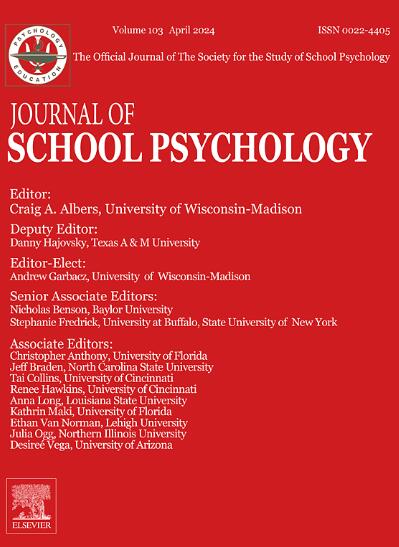An exploratory evaluation of universal social-emotional learning programs delivered during elementary school to Australian students
IF 4.1
1区 心理学
Q1 PSYCHOLOGY, SOCIAL
引用次数: 0
Abstract
Whole-school Social-Emotional Learning (SEL) programs demonstrate promise as an avenue for universally and equitably fostering student social and emotional wellbeing. This study used population data collected in 2015 to examine the association of Australian elementary (primary) school-based SEL programs with students' late middle childhood functioning (aged 11–12 years) on the five social-emotional competencies defined by the Collaborative for Academic, Social, and Emotional Learning (Self-Awareness, Self-Management, Social Awareness, Relationship Skills, and Responsible Decision-Making). A total of 18,643 Year 6 students self-reported competencies on the Middle Childhood Survey–Social-Emotional Learning, and 569 school leaders reported on delivery of SEL to these students via the Survey of School Promotion of Emotional and Social Health. Multi-level regression, accounting for school clustering, compared competency levels among students who did and did not receive SEL at school. Secondary analyses determined the strength of effects for students receiving programs with a high-quality evidence base, for programs supported by little or no empirical evidence, and for evidence-based SEL programs that provided a high degree of explicit teaching (i.e., structured teaching and skills practice) of the targeted social-emotional competencies, each relative to students receiving no SEL programs. Positive significant effects of SEL were observed on four of five competencies (excluding Responsible Decision-Making), with effects being strongest for empirically-evidenced SEL programs that provided explicit teaching of the targeted competency. No significant effects of under-evidenced programs were observed. This novel, population-level evaluation demonstrates the universal benefit of evidence-based SEL programs in supporting elementary school students' development of social-emotional competencies.
对澳大利亚学生小学阶段社会情感学习普及计划的探索性评估
整个学校的社会情感学习(SEL)项目展示了作为普遍和公平地培养学生社会和情感健康的途径的承诺。本研究使用2015年收集的人口数据来研究澳大利亚小学(小学)基于SEL的课程与学生童年中后期(11-12岁)在学术、社会和情感学习合作定义的五种社会情感能力(自我意识、自我管理、社会意识、关系技能和负责任的决策)上的功能之间的关系。共有18,643名六年级学生通过《儿童中期社会情绪学习调查》自我报告能力,569名学校领导通过《学校促进情绪和社会健康调查》报告了向这些学生提供SEL的情况。考虑到学校聚类的多层次回归,比较了在学校接受过和没有接受过SEL的学生的能力水平。二级分析确定了接受高质量证据基础项目的学生、很少或没有经验证据支持的项目和提供高度明确教学(即结构化教学和技能实践)目标社会情感能力的循证SEL项目的效果强度,每一项都相对于没有接受SEL项目的学生。SEL对五种能力中的四种(不包括负责任的决策)有显著的积极影响,对提供目标能力明确教学的经验证明的SEL项目的影响最大。未观察到证据不足的方案的显著效果。这个新颖的,人口水平的评估证明了基于证据的SEL项目在支持小学生社会情感能力发展方面的普遍益处。
本文章由计算机程序翻译,如有差异,请以英文原文为准。
求助全文
约1分钟内获得全文
求助全文
来源期刊

Journal of School Psychology
PSYCHOLOGY, EDUCATIONAL-
CiteScore
6.70
自引率
8.00%
发文量
71
期刊介绍:
The Journal of School Psychology publishes original empirical articles and critical reviews of the literature on research and practices relevant to psychological and behavioral processes in school settings. JSP presents research on intervention mechanisms and approaches; schooling effects on the development of social, cognitive, mental-health, and achievement-related outcomes; assessment; and consultation. Submissions from a variety of disciplines are encouraged. All manuscripts are read by the Editor and one or more editorial consultants with the intent of providing appropriate and constructive written reviews.
 求助内容:
求助内容: 应助结果提醒方式:
应助结果提醒方式:


